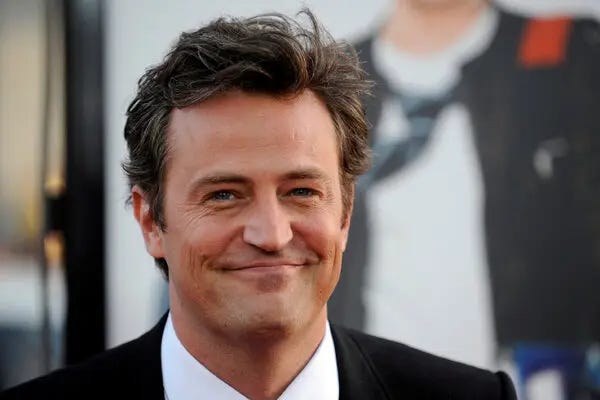POP CULTURE SPIRIT WOW
A couple years ago I discovered that a number of my nieces were watching Friends. It had come on Netflix—that streamer’s greatest achievement has always been its ability to create an audience for shows from other networks. And my nieces adored it.
Which sort of threw me, because Friends is very much the story of my generation, 20something men and women in the early 1990s, with no cell phones, laptops, internet, wifi—think of the jokes that crew would have made about that term—living in a relatively happy era long before 9/11 or the ever-more intense social and political divisions that followed in its wake. At the time commentators frequently talked about it as a fantasy—how did most of these kids afford living in Greenwich Village?
But honestly, our life back then was in many ways a fantasy compared to now. And what the show’s fundamentals—the relationships and life experiences of our 20s, and our friends as the safe harbor to whom we would always return for insight, courage and laughter—absolutely captured our experience.
The thing that sold people on Friends was the relationship between Rachel and Ross. She’d left her fiancé at the altar; he’d been dumped by his wife for another woman—in the 90s homosexuality was something “out there,” an obstacle to our heroes, even if a sometimes gentler one. (The show’s treatment of Ross’ ex Carol was definitely better than Seinfeld’s “Not that there’s anything wrong with that,” but still at times not great.) And the two had chemistry to keep that show steaming along for years.
But not forever. I’m not entirely sure where the show went wrong by that relationship. “Will they? Won’t they?” is the heart of a million romcoms. But boy did it. Rachel Aniston’s immense charm was the life preserver that saved her as her character was forced into a million dumb choices. David Schwimmer’s Ross, meanwhile, became the selfish, low key (and not so low key) misogynist villain that we couldn’t quite bear to hate but also couldn’t quite stand—which while seemingly unintentional on the writers’ part also captured another aspect of 20something friendships.
Into this mounting disaster area stepped Monica and Chandler, a pairing that no one could have predicted from the start—her too type-A, him too immature. And from the start they were a delight, not only because of their unexpected chemistry but because they had the sense of being a team. A secret revealed at the end of season 4, season 5 saw them for quite a few episodes fighting to keep their relationship a secret from their friends. It provided ample excuses for hijinks, but more than that it captured a maturity of relationship, relationship as two friends who care about each other and protect the gift of that—that Ross and Rachel could never appreciate.
Late in the series the writers would discover another potential version of that, Rachel and Joey, two messy, immature people who helped one another to discover they had so much more to offer, who made each other better. The writers inevitably broke them up, saying they felt more like siblings than partners, but anyone could see the truth was the Ross and Rachel of it all was a dictate that could not be overcome, even if it was clearly bad news, the shambling zombie love that simply would not die until it had killed every joy in its path.
But even as it did, we still had Monica and Chandler presiding over the group as friends and sort-of parents, or at the least a glimpse of what more was possible, of what friendship could be found in one another’s arms.
It’s hard to reconcile that image with what we learned over the years about the personal struggles of Chandler actor Matthew Perry himself. How could a man who in later life looked so haunted, like he was being chased by something terrifying, be the same person who had such an easy and infectious laughter about him, who seemed able to walk into a room and naturally make everything better?
While the heat of the media’s attention post-Friends was on the women, particularly Courtney Cox and Jennifer Aniston, I always thought Perry made some of the group’s boldest choices, playing serious roles on Aaron Sorkin’s West Wing and Studio 60 that showcased a range that I found thrilling.
Here’s a scene early in his first episode on The West Wing.
He’d later join The Good Wife as a darker version of his West Wing character. Once again he nailed it so well you were kind of rooting for him even though he was the villain.
That was the thing about Perry—he was that friend you were always rooting for, no matter what and without even thinking about it, really. How could you not love that guy, want good things for him?
Maybe it’s because he seemed the most like us. He was handsome, sure, but not movie star handsome. Even though he’d been on this ridiculously successful show and was no doubt a rich man, he had no celebrity wife or husband for the press to constantly write about. And his comedic talents seemed deceptively familiar. We saw a similar quippy, goofy bounce in people from our own lives, the friends and family we loved to be around. To like him was an extension of our love for them.
So much of the humor on Friends was built around the actors allowing themselves to be the butt of the joke. In some cases, like Cox and Aniston, we knew they were actually movie stars, and so the joke had another, more meta level of watching someone glamorous allow themselves to look silly.
But in Matthew Perry’s case it always felt more natural, less calculated. He was just a guy, dumb and foolish and insecure in the ways that a lot of guys were. He wasn’t of course. He was an actor. This was a performance. But his talent was to allow us to recognize ourselves within him, to see our foible-full humanity and appreciate it, appreciate ourselves.
I don’t know that we can ever truly understand another person’s pain, the burdens they carry, even if they are our dear friends, even if they tell us about them, and Perry very much did try to tell us about them. It’s ultimately just too personal.
Maybe at best all we can do is bear witness to a person who was so enormously generous with his talents, and who fought as hard and as long as he could.
May he rest in peace.
If you’d like to support the writing I do here, my Venmo is scannable below:
See you later in the week.








